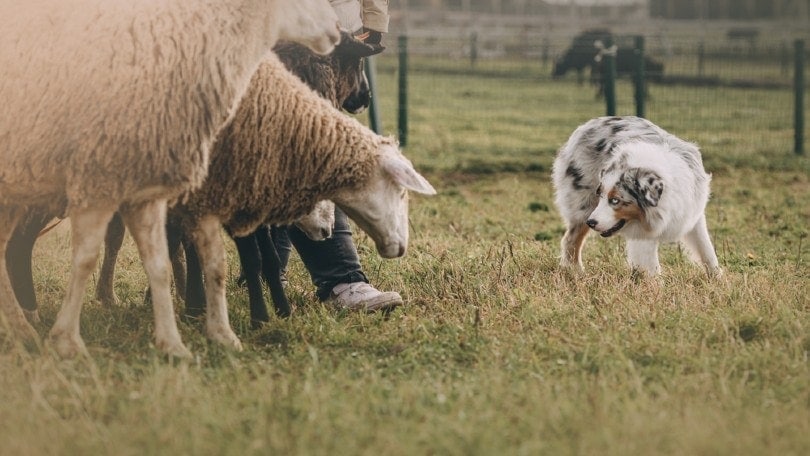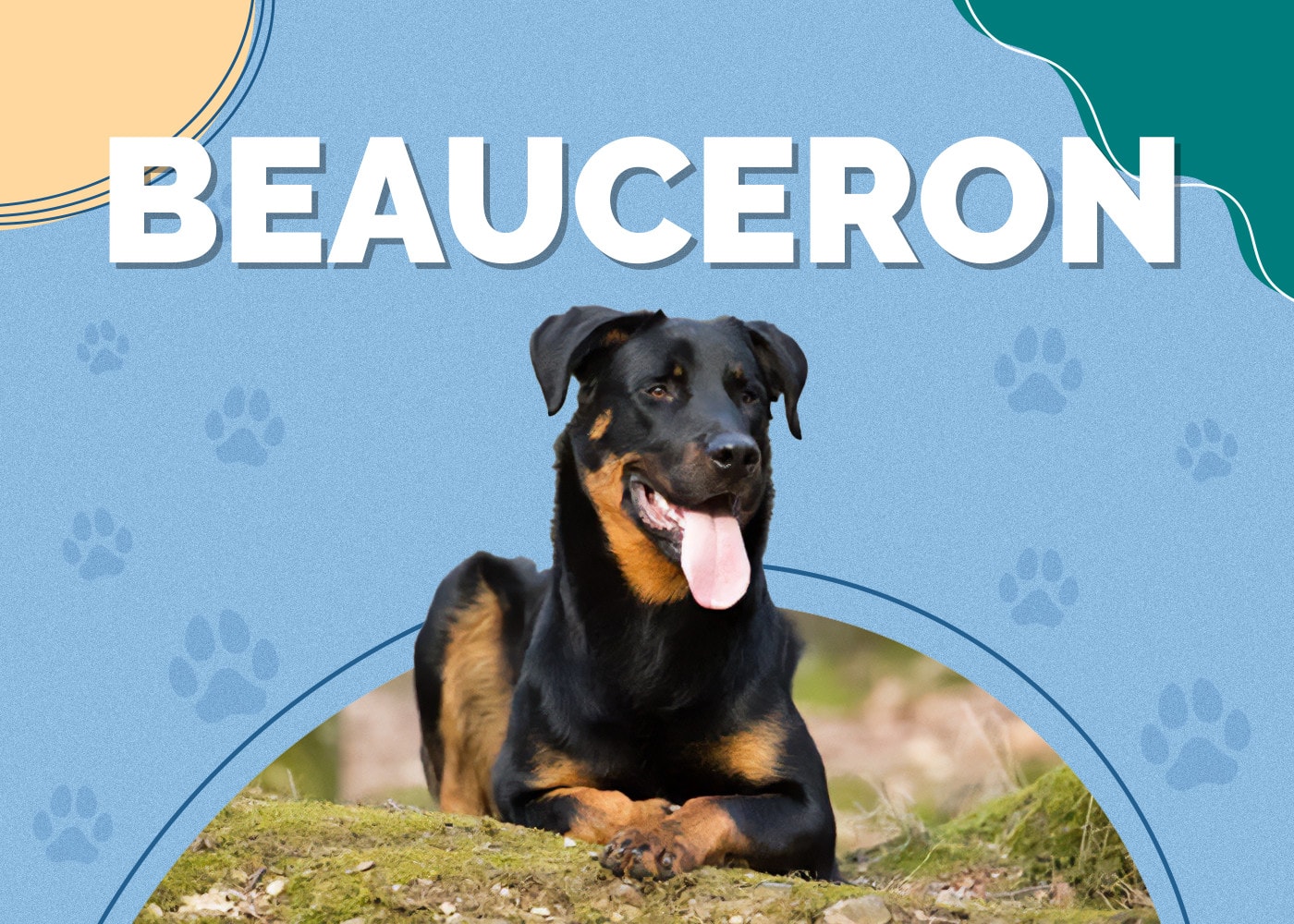Why Do Dogs Whine? 8 Vet-Reviewed Reasons & How to Stop It

Updated on

Whining is probably one of the more annoying noises your dog can make, and sometimes it might seem like they’re making the noise precisely to annoy you. But like growling and barking, whining is a way for your dog to communicate a specific want or need; it’s up to you to figure out what they’re trying to tell you and decide if you need to react.
Not only do you not want to ignore a real need, but you also don’t want to encourage whining and create an unwanted pattern of behavior, resulting in an excessively whiny dog. This might feel overcomplicated, but we’ll look at all the reasons behind why your dog might be whining and the best way to react so you can calm your dog and maybe even stop this behavior. So, let’s get started!
The 8 Reasons the Dogs Whine
1. Wanting Attention
You might notice attention-seeking behavior when doing something that excludes your dog, like working on the computer or talking on the phone. Your dog might whine to let you know that they’re bored or express their displeasure.
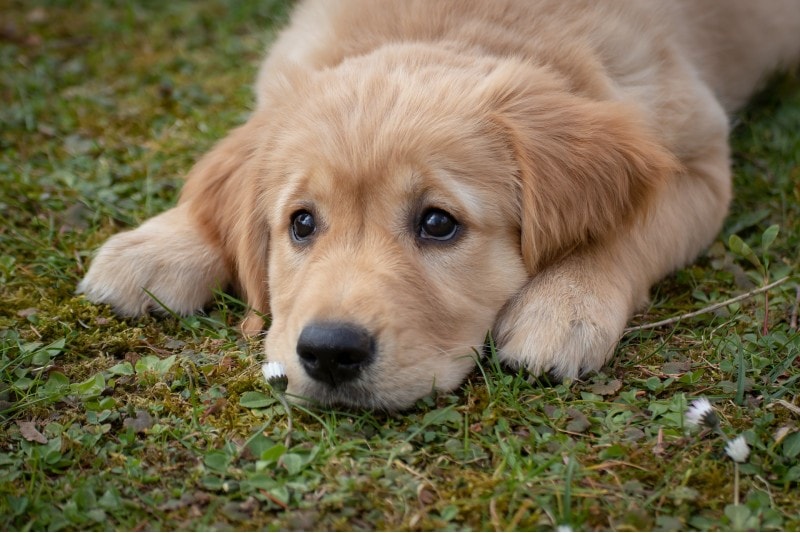
2. Asking for Something
Your dog will try to communicate that they want something; maybe there’s a toy just out of reach, their water bowl is empty, or they want to go for a walk. You might notice their eyes darting from you to the desired object, or maybe they’re much more subtle. Either way, if you ignore these whines, the behavior might escalate, and they’ll have an accident in the house or chew your furniture out of frustration.
3. They’re Scared
Whining relating to being scared or stressed will generally accompany behaviors like pacing, shaking, or panting. Their tails and ears might be tucked in and held low, indicating they feel unsafe.
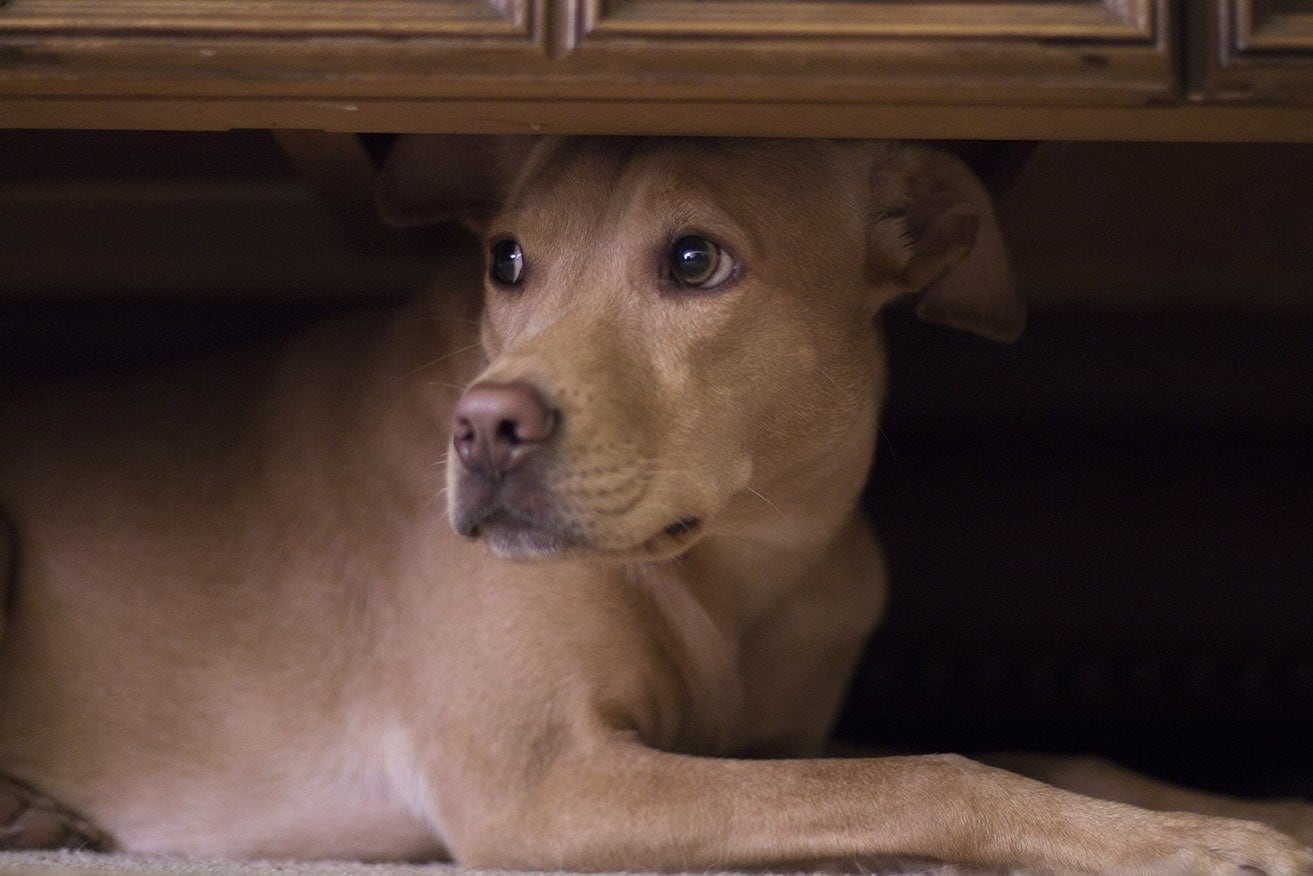
4. Excited
Whining accompanied by running around, a wagging tail, and jumping up and down could indicate your dog is excited. This type of whining links to attention-seeking behavior because the dog is looking for an acknowledgment, like a pat on the head or to be made a fuss of.
5. Anxious and Missing You
A dog that suffers from separation anxiety might feel threatened and upset when their owner dares to leave them. You might notice them whine excessively as you get ready to leave or bark when you open the front door. If this behavior is left uncorrected, your anxious dog can develop more undesirable behaviors like destroying furniture or having accidents in the house.
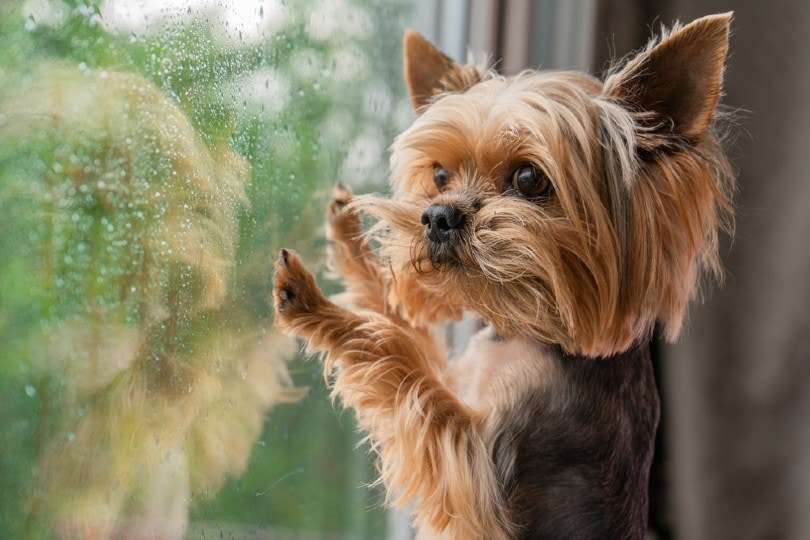
6. Communicating Sickness or Injury
A dog will whine when they’re sick or injured. If the whining is a new behavior and you notice other negative signs, such as limping, lethargy, vomiting, reduced appetite, diarrhea, or any other changes in behavior or regular habits that are unlike your pooch, you should take your pup to the vet for an examination.
Age will also factor into your assessment; older dogs are more prone to hurting themselves, like when they jump off the sofa, and they may suffer from confusion, anxiety, or dementia. Puppies also have a knack for getting themselves into tricky situations.
7. Appeasement Behavior
If your dog tends to whine when around people or dogs, it could be a sign that they’re indicating that they are submissive. If the whining is accompanied by a lowered body, averted gaze, tail tucked in, and head down, your dog might be adopting a submissive posture.
Whining may sometimes also be a way of saying sorry. So, if your dog has done something they shouldn’t, like knocking over a trash can, it might be part of an apology. This behavior can be linked to your dog’s ancestors, the wolves; breaking pack rules can result in being shunned. To be forgiven, they would put their tail between their legs and lower their head, which might be a familiar posture when your dog is sitting next to an overturned trash can, looking guilty.

8. Learned Behavior
If any of these behaviors are left unchecked, or you overreact to whining, your dog can end up whining out of habit. However, not all learned behavior is bad. Whining to be let outside to go potty is a good, learned behavior, but whining for attention on their terms when they don’t necessarily need anything is an undesirable learned behavior.
 People Also Ask (FAQ)
People Also Ask (FAQ)
How to Stop Your Dog From Whining
You’re probably used to a little whining from your dog every so often, but excessive whining can be frustrating to live with. However, you don’t want to miss your dog whining for a serious reason, like an illness or injury, because you’ve grown used to hearing the sound. The good news is that there is training you can do and ways to react that can help your dog to whine less, or maybe not whine at all.
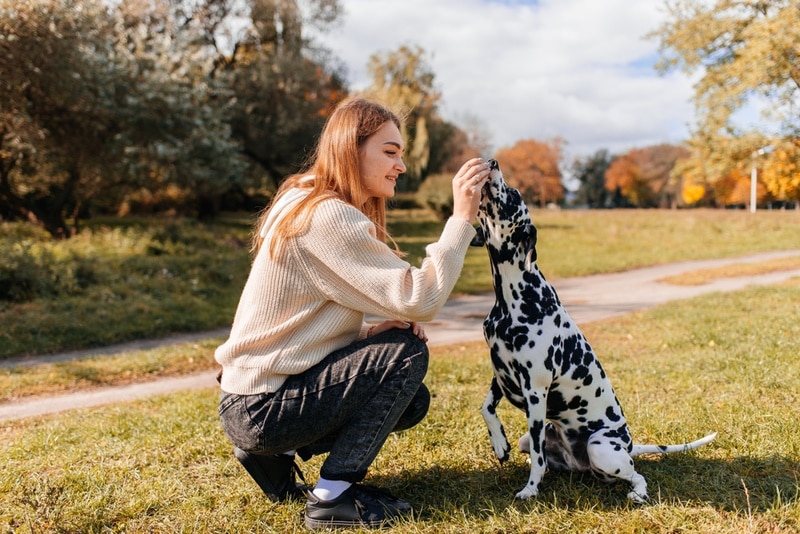
- Look for accompanying behaviors: Your dog can’t tell you the reason behind the whines, so you’ll need to try and interpret it yourself. In time you can distinguish the “I’m bored” whines from the “I need something important” whines.
- Never yell or punish: Whatever the reason for the whining, never use punishment or harsh words to try and correct the behavior. This can make your dog feel stressed and fearful, damage your bond and trust, or could result in an aggressive reaction.
- Approach carefully: If the whining is due to stress or pain, your dog could act unpredictably or even aggressively if they think you’re going to hurt them more or if they’re stressed due to another cause. If you suspect your dog needs medical attention, take them to the veterinarian immediately.
- Find the source of the stress: If your dog seems anxious or stressed out about something, try and find the source and remove it if possible. If it’s due to separation anxiety, for example, you can desensitize them to things they get stressed about. You can get your dog used to you leaving by showing them every time you pick up keys or your coat that you aren’t always leaving. This will mean they are less stressed in the run-up to your departure. You could also leave them for short periods and build up the time gradually. If you’re feeling overwhelmed tackling the issue by yourself, look into behaviorists in your area that can help.
- Giving them what they want: If your dog is whining to go outside for a pee, obviously give in to this need. However, ensure you aren’t unintentionally encouraging whining for food or attention. If they are the source of the whining, redirect their attention before you give in to their wants so they don’t associate whining with getting their way.
- Ignoring and not giving in immediately: It’s difficult to ignore your dog when they’re whining, but if you’re sure there is no real need behind the sound, it’s a good idea to try and ignore it. Once they’re silent again, offer a treat or praise. This is the perfect opportunity to work on your training and the “quiet” command.
- Avoid boredom: Make sure your dog’s environment is stimulating enough; if they have enough toys and are getting enough physical and mental stimulation, they are less likely to be bored and have pent-up energy left for whining.
Should You Be Concerned if Your Dog Whines in Their Sleep?
Whining in their sleep might be concerning if you’ve never had a pet dog before, but it’s generally nothing to worry about. It’s likely that your dog is just dreaming! Like humans, dogs go through REM and non-REM cycles of sleep.
So, when they’re going through the REM level, they might twitch, whine, and even bark as they relive the fun adventure you just took them on earlier that day. If there’s something new about their movements or vocalization that worries you, check with your vet.
Your Puppy Whines More Than Your Adult Dog, Is This Normal?
Yes, this is completely normal. Puppies may whine initially because they miss their mother and littermates or are experiencing stress due to moving house, and it’s normal for them to whine more than their adult counterparts as they settle into their new home and new family. You might feel guilty for ignoring a whining puppy that is just seeking attention, but it’s important to be moderate and considerate while offering them plenty of reassurance and support.
Try to avoid reinforcing the behavior because a whining puppy can make for an excessively whiny adult. Instead, wait for silence before rewarding your puppy with playtime or a treat. However, make sure whining is not related to their toilet needs, as puppies need to toilet frequently and cannot hold it in as long as adult dogs can. It may take a few weeks or months for you to learn their habits and behaviors, as well as for them to get accustomed to your routines.
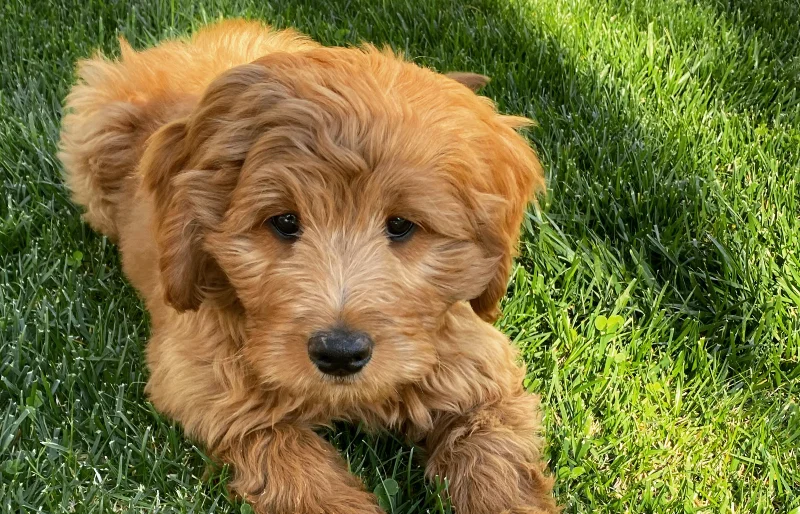
Conclusion
Your dog might be whining for many reasons, ranging from separation anxiety and wanting a little attention to communicating illness or injury. When the crying isn’t related to a bathroom break, pain, or sickness, you may not need to react because you don’t want to encourage the behavior. However, a whine that indicates your pup needs to go outside should never be ignored! Whatever the reason behind the whining, your reaction is of utmost importance because the results could mean an excessively whiny dog or the end of the whining altogether!
See Also:
- Why Is My Dog Excessively Licking His Paws? 5 Vet-Approved Reasons
- Why Is My Dog Drooling & Acting Strange? 15 Vet-Approved Reasons
Featured Image Credit: Seregraff, Shutterstock



